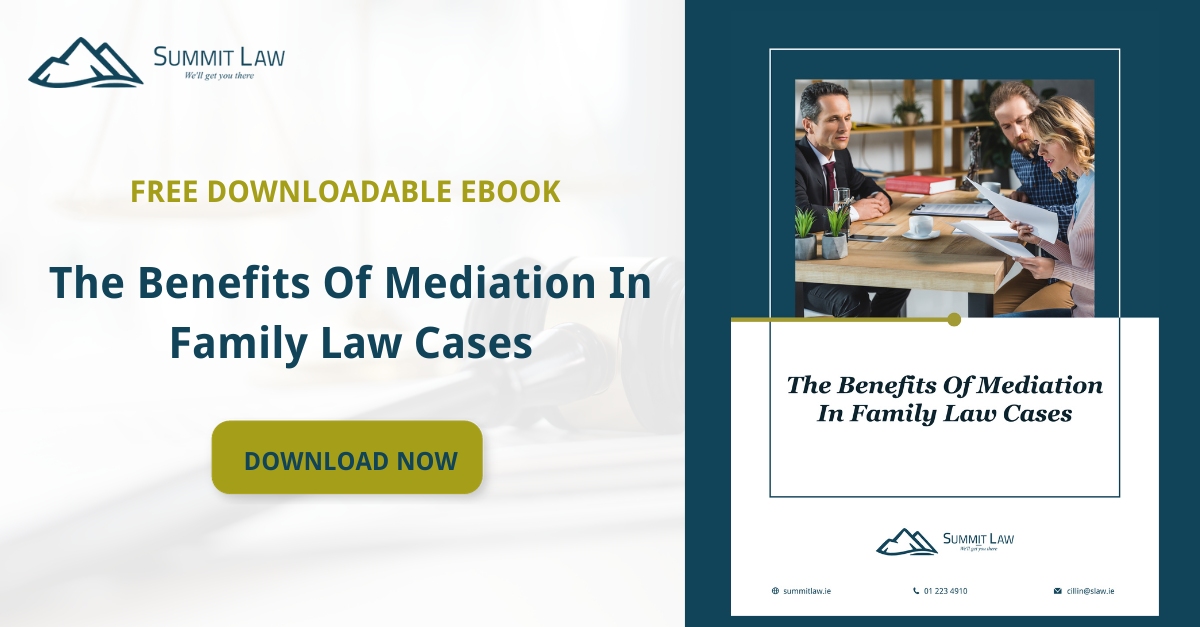In recent years, there has been an increase in the use of mediation in family law cases as a method of resolving conflict within a family unit. This growth in people accessing mediation services is closely linked to the introduction of the Mediation Act 2017, which makes it a requirement for couples to be offered mediation as an alternative to court proceedings.
For anyone currently going through a family dispute or facing the challenging process of separation or divorce, it can be difficult to navigate the different routes available for resolution, particularly when there are children involved.
Choosing mediation at any stage of the process can be hugely valuable for all parties concerned so in this article, we explore the benefits of mediation in family law cases.
What do we mean by mediation in family law?
Mediation in family law refers to a process where a neutral and trained third party, known as a mediator, facilitates communication and negotiation between the parties involved in a family dispute. The mediator helps the individuals identify their concerns, explore options, and work towards finding mutually acceptable solutions.
This approach allows the parties to maintain control over the decision-making process, rather than leaving it in the hands of a judge in a courtroom. It’s important to note that mediation is an entirely voluntary process, however, the benefits of choosing this option over the court process make it worth the effort for all involved.
The advantages of mediation in family law cases
Reduce stress and anxiety
There’s no doubt that going through the breakdown of a relationship within a family unit can be an anxious time. Having an independent mediator can provide balanced support and help alleviate the stress and anxiety that go hand in hand with a dispute. It can also reduce the level of hostility leading to a more amicable resolution in an environment that is certainly a lot less stressful than the courtroom.
Cost-effective
Mediation is often more cost-effective than traditional litigation. To put it simply, the more time spent in the court setting, the more expensive it will be to resolve. By avoiding lengthy court battles, individuals can save significantly on legal fees and related expenses such as taking time off work to appear in court.
Maintain privacy
Family disputes can be emotionally charged and sensitive, and particularly in areas of Ireland with tight-knit communities, a family going through this process certainly wants to avoid everyone knowing their business. Mediation provides a confidential environment where parties can freely express their concerns and work towards a resolution without the fear of public disclosure.
Improves communication between parties
Family dynamics are intricate, and maintaining positive relationships, especially when children are involved, is crucial. Mediation promotes communication, understanding, and cooperation, which can contribute to preserving those all-important family relationships.
Faster resolution
Mediation can often result in a quicker resolution compared to litigation, which can be a lengthy and time-consuming process. By addressing issues directly and efficiently, mediation helps all involved move forward and rebuild their lives sooner. Furthermore, any decisions made during mediation can be implemented straight away rather than waiting for a court date.
Flexibility and control
Unlike litigation, where decisions are made by a judge, mediation allows individuals to have more control over the outcome. Both spouses can work together to find creative solutions that best meet their unique needs and interests.
How mediation can help with your family dispute
Mediation provides a supportive, structured and most importantly, neutral environment where parties can openly discuss their concerns and explore potential solutions. The mediator helps facilitate productive dialogue, ensuring that everyone’s perspectives are heard and understood.
Interestingly, mediation tends to have a better success rate in family law cases than in other fields of law. Choosing mediation can be particularly beneficial in family law cases as it promotes cooperation and collaboration, helping to find mutually agreeable solutions that are in the best interest of all parties involved. By focusing on the individual needs and interests of both parties equally, mediation can lead to an amicable resolution so that everyone can move forward to a more peaceful future.
Summit Law is your provider of mediation in family law
At Summit Law, we understand the complexities and challenges that can arise in family law cases.
Our experienced team acknowledges the value of constructive communication and negotiation in family disputes. While we do not offer mediation services directly, we can recommend trusted third-party mediation services that can provide a safe and respectful space for all parties involved, helping you navigate the mediation process effectively.
So, if you’re going through a family dispute, consider engaging in mediation as a way of resolving this dispute faster, saving you money, and more importantly, preserving your family relationships.
Nobody has to face this challenging process alone. Let Summit Law guide you towards a positive outcome and a brighter future – contact us today to learn more about trusted third-party mediation services that can help you achieve a fair and satisfactory resolution.
Make sure you also check out our blog and resources for more information on our legal services.



